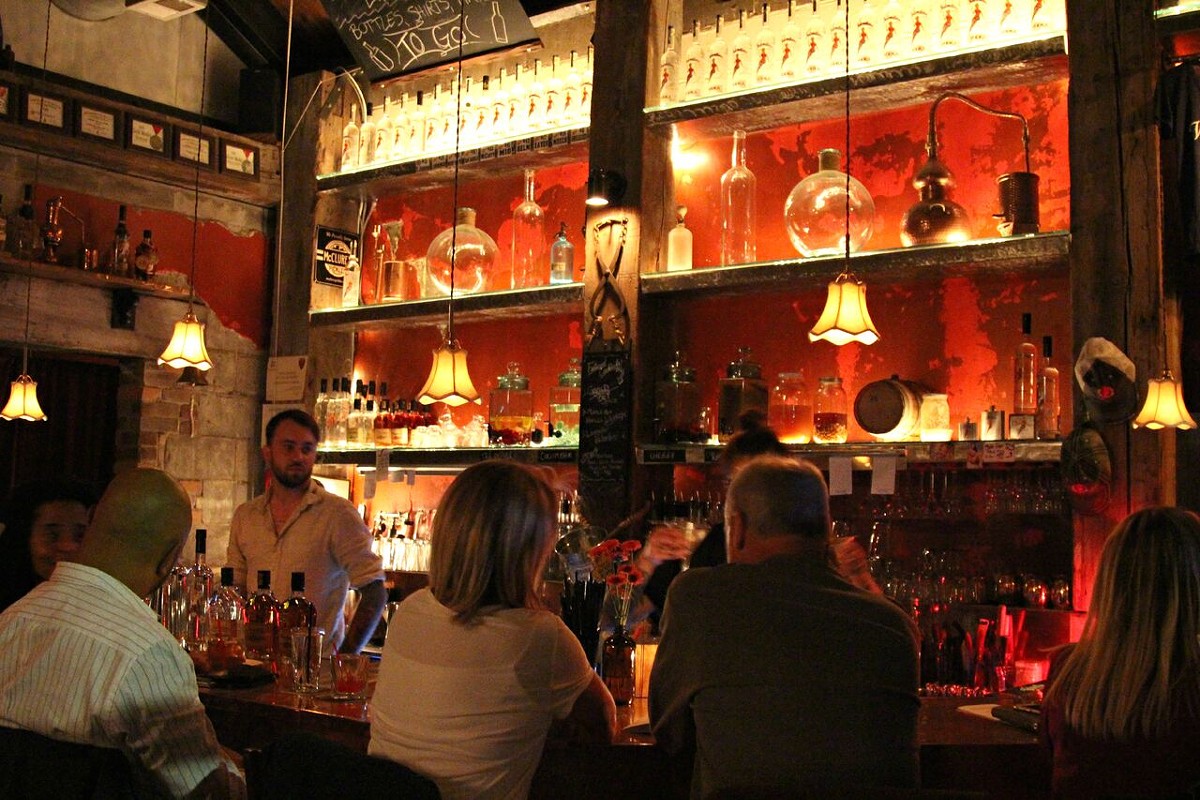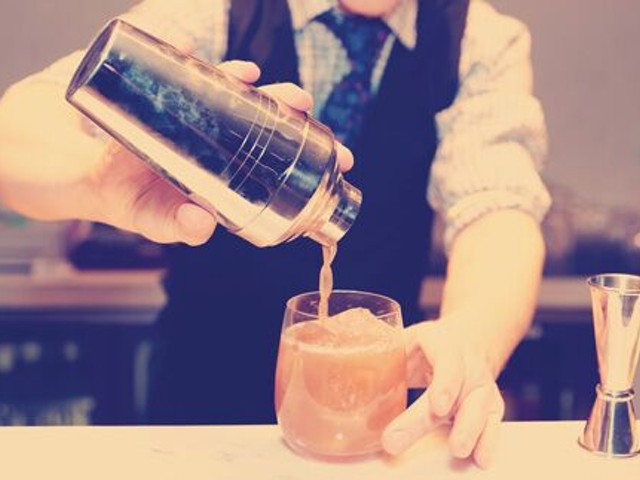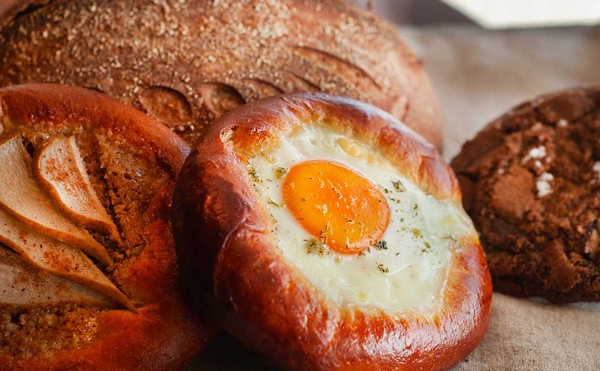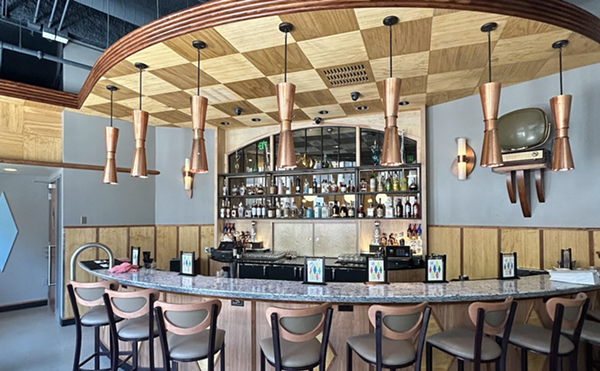Detroit has been called many things including, most famously, Rock City and the Motor City. It could just as easily be known as Booze City, given its long love affair with hooch — a love so strong not even the heavy hand of the state could quash it.
It's been that way from the beginning. Surveying Detroit's early history from a post-Prohibition vantage point, noted social worker William J. Norton observed, "Respect for the liquor laws appears to have been very meager." He estimated that, in a city of only 900 souls, between 20 and 30 licensed taverns operated, while "still there were blind pigs in abundance." During Prohibition, the The Detroit News reckoned there were as many as 25,000 speakeasies operating in the area, while the "Windsor-Detroit Funnel" served as the conduit for, according to some sources, as much as three-fourths of all the alcohol smuggled into the country.
Following Prohibition's repeal, a new thicket of laws arose to control the manufacture, distribution, and sale of demon rum and its brethren. The effect, over time, was for the booze to flow mainly from the large national and international distillers that could afford to navigate the expensive and sometimes bewildering legal morass, not to mention run lavish ad campaigns. To be sure, every Don, Duck, and Peggy enjoyed their three-martini lunches and cocktail soirees in the ensuing decades, but somewhere along the way, the idea of local, finely crafted liquor got lost. Until now.
Going micro in metro Detroit
Following in the foamy footsteps of the ever-growing craft brewing business, a craft distilling movement has sprung up in recent years, and metro Detroit's microdistilleries — boutique-style producers that make spirits in relatively small batches — are at the forefront of Michigan's nascent liquor industry. They aim to do for spirits what craft brewing has done for beer: namely, meet (and nurture) a growing demand for quality and variety, while serving as a boost for the local economy.
According to the newly formed Michigan Craft Distillers Association (MCDA), the state now ranks third nationally in the number of distilleries, at 40 and counting, and craft distilling has the potential to contribute up to $400 million annually to Michigan's economy. This growth spurt echoes a national trend.
"When we started, there were around 20 microdistilleries in the country. Now there are over 700 and it keeps growing," says Rifino Valentine, founder and owner of Valentine Distilling in Ferndale and president of the MCDA. "I'm excited that nationally the microdistilling movement has been gaining ground. It's great that Detroit has really picked up on this, too."
Like other microdistillers, Valentine is passionate about crafting a quality product. He worked for three years with Kris Berglund, head of Michigan State University's artisan distilling program, to develop recipes before introducing his first spirit, Valentine Vodka, in 2008.
"I've always appreciated products that were made by hand, in small batches," he said. "I think it's important to know that care, good ingredients, and a lot of effort go into a product."
Valentine's painstaking approach — which relies on his own senses, not computerized processes, and includes using 100% Michigan ingredients and materials — is validated by the long string of national and international awards his spirits have won, including the 2014 "World's Best Cask Gin" designation from the prestigious World Gin Awards in London for his Liberator Old Tom Gin.
Recently production moved from the Valentine tap room to a 16,000-square-foot production facility, also in Ferndale, capable of producing up to 50,000 cases a year. Demand remains high for the flagship vodka and gins, as well as Valentine's White Blossom Vodka — vodka infused with elderflower and grapefruit — and Woodward Ltd. Bourbon. Valentine's spirits are sold in seven states, Canada, and even Europe, and there are more products coming, including a rye whiskey.
But for Valentine, it's about even more than creating world-class beverages. It's also about the revitalization of a great American city.
"One of my main premises at the beginning was to be a catalyst to bring manufacturing back to Detroit," he says. "That's why it's particularly satisfying that so many others have jumped on board to make the city a haven for distillers."
Distillation City
"So many others" now includes three distilleries in the city proper. In November 2013, Two James Spirits in Corktown became the first licensed distillery to open in Detroit in nearly a century. Two James was soon joined by Our/Detroit on Bagley Avenue and Detroit City Distillery in Eastern Market, both opened in August 2014.
Two James is the brainchild of friends Peter Bailey and David Landrum, who named the company after their fathers (whose names you'll never guess). With partner Andrew Mohr, they converted a former taxi repair shop on Michigan Ave. into a distillery and tasting room, where they produce and sell 28 Island Vodka (named for Prohibition-era hideouts in the Detroit River), Old Cockney Gin, and three whiskeys: Grass Widow Bourbon, Johnny Smoking Gun (a 70-30 corn/rye mash), and Rye Dog White Whiskey. Distiller Joe Lordon is always working on new things, recently introducing Absinthe du Nain Rouge, named after that diminutive bane of the city and served in the traditional French manner — with a cold water fountain drizzled over a sugar cube and into the glass. Two James spirits are available at more than 300 retail outlets throughout the state.
Our/Detroit is unusual in two ways: First, it was born out of an international concept called Our/Vodka from French conglomerate Pernod Ricard, which developed a single recipe and tasked affiliates from Berlin to Amsterdam to Seattle to, yes, Detroit, with producing the vodka using their own local ingredients on stills designed by corporate engineer Vincent Hoarau. Second, it's run by an all-woman team, consisting of strategist Kate Bordine, distillery manager JeanMarie Morrish, and sales director Lynne Savino, who are looking to "bring authentic Detroit flavor to the brand while strengthening our mission to invigorate Detroit through community engagement, outreach and celebration." Mixed cocktails, along with the bottled product, are available at the open, minimalist tasting room; retailers throughout Michigan also carry Our/Detroit Vodka.
There are eight people — friends from Bath (Michigan, not England) — behind Detroit City Distillery, a production facility and tasting room located in a 2,700-square-foot former slaughterhouse on Riopelle St. near Eastern Market. The partners include distiller J.P. Jerome, a former Bell's brewer with a Ph.D. in microbiology, and Michael Forsyth, a retail development manager for the Detroit Economic Growth Corporation and director of REVOLVE Detroit, a program designed "to foster the evolution and vibrancy of Detroit's neighborhood business districts." Detroit's underground history during Prohibition informs everything from the low-key, exposed-brick speakeasy vibe of the tasting room to the names and labels of DCD's local-grain-based spirits, which include Railroad Gin, Two-Faced Blended Bourbon, Gilded Age Vodka, and Bloodline Whiskey, the latter two of which won bronze medals at the American Distilling Institute's 2015 competition.
Growth by design
Whence cometh all this growth among microdistillers? Most are quick to point to the success of their craft beer brethren as a catalyst.
"Here in Michigan, we have great agricultural resources and a ripe audience that's already been groomed by the local craft beer guys for a new industry like this," said Rich Lockwood, owner and distiller at the area's newest micro, Royal Oak's Motor City Gas, which opened in March. "I have no doubt we'll see craft distilling continue to take flight the way the craft beer industry has."
But legislative changes have also greatly aided the microdistilling movement's growth. At the time of Valentine's debut, the state began to relax and simplify some of the stringent post-Prohibition laws relating to distilling. The 2008 repeal of a law allowing only fruit-based spirits to be distilled meant not just vodka but also whiskey, gin, and other liquors were fair game. The cost of a license for microdistilling — defined as producing 60,000 gallons or less a year — was lowered from $1000 to $100. Perhaps most importantly, a law allowing distillers to sell their spirits on premises directly to consumers opened the door to all the tasting rooms we see today.
"Most states with distilleries do not allow tasting rooms, but Michigan does," says Joe Schebel, founder and owner of Rusted Crow Spirits in Dearborn Heights, which opened earlier this year. "You basically have a bar on site and people can come in and try a sample or buy mixed cocktails — you can't do this in places like Washington, Illinois, or Florida."
Schebel eased into distilling from his earlier career designing exhibits for the likes of General Motors, Porsche, Ford, and Apple. In fact, it was the design aspect that attracted him.
"I was looking at liquor bottles and noticed they're all basically the same," he says. "You go to a party store and look at all the vodkas and you either already know which brand you want or else you're drawn to something — the name, the color, the bottle, the label. That's when I decided I could start a distillery and make interesting bottles that would appeal to niche markets and not just the masses."
Schebel's design background also comes through in the Rusted Crow tasting room, whose warm colors and gothic arches play host to the company's centerpiece: a tricked-out 1930 Ford Model A Rat Rod, which has won 11 best of show awards in the 12 car shows it's been in, including Detroit's own Autorama.
The spirits themselves — which can be found in over 700 locations around the state, including venues like Comerica Park — have also been garnering accolades. Rusted Crow's Detroit Steam Vodka took "best of category" at the American Distilling Institute's 2015 blind tasting, while Ginstache Gin earned a bronze medal. Schebel attributes this success to high standards and unique processes, including the use of artesian spring water from Hemlock and obsessively fine filtration.
Also produced from Rusted Crow's 100-gallon still and 350-gallon mash tank are Davy Jones' Rum, Murder Mitten Moonshine, Ginger Devil Flavored Vodka, and "secret ingredient" Phil McCracken Liqueur. Schebel expects to roll out Rust Belt Bourbon and Rust Belt Sweet Cherry Rye in 2016.
Brewers mashing in
The growth in microdistilling has not escaped the notice of at least some of the area's established craft brewers, who are also getting in on the act.
"Changes in the law allow breweries and distilleries to share space, which makes sense," says Mark Rieth, owner of Detroit's largest brewery, Atwater. "You can use similar equipment and not have to have completely separate facilities. The process is similar — you make a mash and you can move it to the still or else make beer out of it. It's the same thing from a fermentation standpoint."
Atwater currently offers spirits in their two tap rooms in Detroit and Grosse Pointe Park based on their most popular beer brands, including Dirty Blonde Vodka and Vanilla Java Rum. For now, Atwater is purchasing neutral grain spirits to package at the brewing facility on Joseph Campau, but they've installed a 66-gallon still with the goal of distilling on site and launching into distribution in the spring.
Late last year, Griffin Claw Brewing in Birmingham also began selling bottles of spirits in their taproom, including Grain Vodka, Potato Vodka, Botanical Gin, and Black Strap Rum. For now, brewmaster Dan Rogers and co. have no plans to distribute the spirits beyond the taproom, but they do plan to experiment making fruit brandies, rye whiskeys, absinthe, and whatever else they can think of.
Looking ahead
There are, of course, thorns among the roses. Despite a relaxation of some rules, many state and federal hurdles remain, according to Valentine, including some of the highest state liquor taxes in the country. At the federal level, local microdistillers making small batches are taxed the same as the big international concerns, who "spill more in a day than I produce in a year," he says.
"Microdistilling is a new industry that a lot of people are not familiar with, so there are lots of hurdles at every step along the way," says Motor City Gas's Lockwood, who makes a variety of whiskeys available only from his Royal Oak tasting room. "Michigan can also make opening a microdistillery quite a bit more difficult than a brewery or winery, especially for smaller self-funded microdistillers like us. Overall it's getting easier, but more needs to be done to make things easier, especially for the small guys."
Some relief may be on the way, at least at the federal level. U.S. Senator Gary Peters (D-Michigan) is co-sponsoring a bipartisan bill that's gaining momentum to lower the federal excise tax from $13.50 per proof gallon to $2.70 for a producer's first 100,000 gallons.
But Schebel notes that, regardless of what the politicians do or don't do, the genie is out of the liquor bottle — and it's not going back in.
"The market is going to increase," he says. "Michigan is a highly entrepreneurial state, so if there's money to be made, business will follow."






